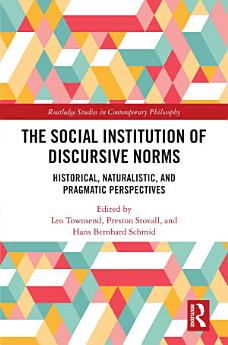The Social Institution of Discursive Norms: Historical, Naturalistic, and Pragmatic Perspectives
About this ebook
The chapters are divided into three thematic sections. The first offers historical perspectives on discursive norms, including a chapter by Robert Brandom on the way Hegel transformed Kant’s normativist approach to representation by adding both a social and a historicist dimension to it. Section II features four chapters that examine the sociality of normativity from within a broadly naturalistic framework. The third and final section focuses on the social dimension of linguistic phenomena such as online speech acts, oppressive speech, and assertions.
The Social Institution of Discursive Norms will be of interest to scholars and advanced students working in philosophy of language, philosophy of mind, and social philosophy.
About the author
Leo Townsend is a postdoctoral researcher in the Department of Philosophy at the University of Vienna. He works on collective intentionality, social epistemology, and philosophy of language, and has published papers on group speech and group silencing, the nature of trust, collective belief, group agency, and epistemic injustice.
Preston Stovall is a postdoctoral researcher in the Philosophical Faculty at the University of Hradec Králové. He works on the philosophy of language, metaphysics, and themes in German idealism and American pragmatism.
Hans Bernhard Schmid is Professor of Political and Social Philosophy at the University of Vienna. His research interests include social ontology, phenomenology, and existential philosophy.





